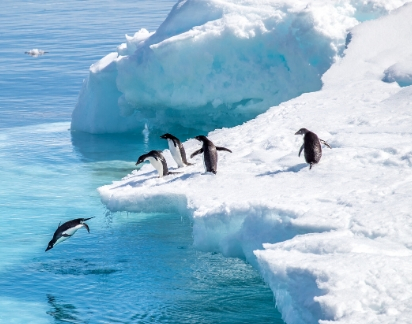Winter is here. The days are shorter and colder. All around us, nature is changing and adapting to the new season. Some animals, like bears, hibernate. Other species move south for the winter. Even plants and bugs adapt to the new season.
Research shows that the human brain also responds to seasonal environmental cues, adjusting our circadian clock, which triggers physical, mental, and behavioral adjustments to follow changes in our daily cycle of light and darkness. These triggers, in turn, signal the right time for periods of sleep, wakefulness, and even hunger.
Let’s take a closer look at nature’s best health practices in winter. Before bears hibernate, they pack on the pounds in order to prepare for a long slumber in which they will live off their fat and ingest no food at all. Ultimately, when a bear wakes from hibernation in the spring, he or she has ultimately lost up to 60 pounds.
When winter hits for humans, the opposite happens: we start eating more and ultimately gain weight! Why? Because our definition of “hibernation” is staying inside more often, exercising less, and eating more unhealthy comfort food, especially during the holidays. Research shows most weight gain happens in the winter season. Through the years, the extra pound or two we gain each winter can add up and negatively impact our health. If we’re not going to actually hibernate, we can’t act like bears.
Maybe we should take some lessons from penguins. There are 18 different species of penguins that live in the southern hemisphere. Many of those species thrive in Antarctica’s brutal climate where temperatures can reach 100 degrees below zero. Penguins remain active despite the weather. Rockhopper penguins, for example, climb 90-foot cliffs to nest their eggs. Adelie penguins travel 3,000 miles to join breeding colonies. Male Emperor penguins huddle together in large colonies to protect their family’s eggs while the females travel hundreds of miles to find food. Penguins are so fit, they can swim up to twenty miles an hour. And did you know that penguins developed flipper boxing long before humans discovered cardio kickboxing? Pretty cool, right?
So, if penguins can do these amazing things when it’s below zero outside, we can certainly waddle our way over to the gym at least a few times a week—even in the winter.
This winter try to be less like a bear and more like a penguin. Follow these five tips to stay happy, healthy and fit this winter:
- Get outdoors in natural daylight as much as possible. The sun’s ultraviolet rays help our bodies make Vitamin D, which is important for our bones, blood cells, and immune system. Vitamin D also helps us take in and use certain minerals, like calcium and phosphorus.
- Eat plenty of fruits and vegetable, especially those that contain Vitamin C, D and E. These vitamins boost the immune system
- Stay hydrated. Our body needs water. When we are in dry heated building and there is less humidity outside, we get dehydrated more easily…so don’t forget to drink plenty of water every day in the winter.
- Get enough sleep. Also, wake up and go to sleep at the same time each day. This can help your circadian clock stay in sync with nature and stabilize your sleep/wake cycle among other benefits.
- Stay connected with others. Because we tend to stay inside more in the winter, we also tend to get isolated. This isolation can sometimes lead to sadness or depression. Make sure to push yourself out the door to see friends and family during the winter months.
For more tips and resources on seasonal health, check out my book, Feel Good Health: The Body & Mind Guide for Healthy Living All Year.


It’s go time Penguin time !